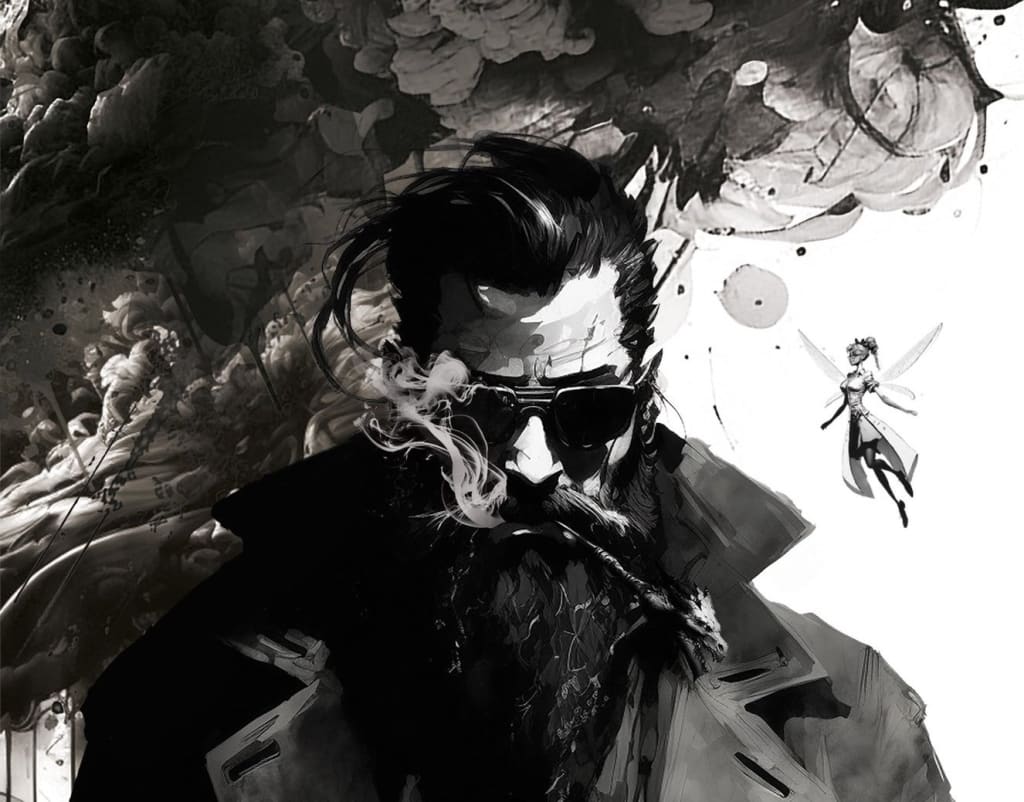Be Weird
The only way to beat AI fiction? Get your freak on.

I truly wish I didn't have to keep writing about AI. I haven't come across a worse tech trend since non-fungible tokens which were...
*Weeps quietly*
Unfortunately, there are plenty of blithering idiots who are rather keen on AI systems (like Chat GPT). In particular, they have recently shown themselves keen to replace writers and artists entirely.
I really wish this was a case of me overhyping something. I would much rather be hysterical over a non problem than soberly considering an actual one.
Unfortunately, that's not the case. AI poses an existential threat to those who create things.
AI Fiction Is Already Here—And It's Selling
Setting aside the fact that tools like Chat GPT aren't actually artificially intelligent at all, and are more like very good predictive text generators, the fact remains that people are already trying to sell creative works made by these tools.
I can think of three recent examples in the book world.
In the first, an individual in Canada (who I will not name, because I don't think this dingleberry deserves the publicity) made headlines recently because he'd written 97 books using AI, a fact that somehow managed to get him written up in Newsweek and Business Insider, because of course it fucking did.
Never mind the fact that the books in question were between two and five thousand words in length, or around the number of words I wrote PER DAY.
Never mind that he'd barely sold 600 copies at the time of those articles, although one assumes he has now sold rather more.
Never mind the fact that what he asked the AI to write is almost certainly derivative and clumsy. I don't know if this is true, because I don't actually care enough to read his output. He can get in the fucking sea.
The fact is, an idea is slowly penetrating the public consciousness: that AI books are acceptable.
The second example comes from what is known as the Self Published Fantasy Blog Off (SPFBO). This is a wonderful annual event, run by fantasy author Mark Lawrence, that shines a spotlight on indie books.
This year, one of the novels and contention for the big prize was a book called Bob the Wizard, by author MV Prindle. Great title, great concept (former garbage man turned surly, cigar smoking wizard goes on a magical quest? Yes please!)
It also had a great cover—check the picture at the top. Unfortunately for Prindle, the artist who created it used an AI art generator to do so, without his knowledge—and then vanished when evidence was presented.
Third example: Sudowrite. They're a delightful AI story platform that loves to couch what they do in softly-lit, friendly, bubbly talk of COLLABORATION and FINALLY WRITING YOUR BOOK and BEATING WRITERS BLOCK GUYSSSS.
The reality, of course, is that they're a bunch of grinning, buzzword-spouting tech bros who sense a quick buck.
Recently, these wobble-fucks launched Story Engine, which would allow would-be writers to generate novel length texts.
While Story Engine was in development, the fine folks behind Sudowrite invited writers to submit their full manuscripts in return for AI-generated outlines and synopses.
These are things writers need before publishers will put out their work, and I speak from experience here: they are a pain.
Thousands of writers eagerly took up this offer. The program was called Shrink Ray, which, I will admit, is a neat name.
When Story Engine dropped, the writing world in general asked pointed questions about how it was trained. Some were quick to suggest that it was rather convenient that Sudowrite had in its possession thousands of unpublished manuscripts...
They were distinctly silent on the matter.
(To be clear: this has not been proven. We still do not know exactly how Story Engine was trained, or what Sudowrite used. I don't want to get into the weeds on this—there's a great summary here—but there is some evidence to suggest that Sudowrite did, in fact, use others' works to train their hideous little whiz-bang)
(Also part of that evidence is apparently the fact that Story Engine seems to know a specific and very graphic sexual term used by a segment of the fan fiction universe and...look, I think at this point we can all back away slowly. None of us need this in our lives).
But you start to see where I'm going with this. It doesn't matter if the quality sucks, which it does. It doesn't matter that the results will almost always be boring and derivative and trite, which they are.
It matters that it's possible to make money from this.
Get Your Freak On
I have seen hundreds and hundreds of people, most of them writers, moaning online about how those who use the tools to create books don't understand the purpose or joy of writing.
My response is simple: they don't care.
They do not, to paraphrase the author Bill Bryson, give a paramecium's shit.
This is about making as much money in the easiest way possible.
And because publishing is, for better or worse, a business, this is going to have a huge impact on authors.
Not to mention cover artists, audiobook narrators, copy editors...everyone really.
For you, as a reader, that means it's going to be harder to find decent books. Quality is going to take a massive dive.
Publishers will begin regularly putting out books written by AI, and punched-up by a human. Most of their author lists will vanish, save for a few big names. After all, same money, fewer advances to pay.
I wish I had better news. And I certainly don't plan to stop what I'm doing, in terms of putting out cracking books. I'm also fortunate that I work with publishers and editors who, and I know this for a fact, would rather vomit than see their names attached to any of this garbage.
In fact, I'm going to use what I do to fight back.
See, I had a revelation this week. As authors, we can't win the arms race here. We are already at a stage where artificial intelligence can produce readable work that can be sold. Fighting that would be like trying to fight a tsunami with a bread knife.
But what I realized is that we already have a very powerful tool at our disposal. That tool is our voices.
By this I mean: the individual voice and touch each writer has. As hard as an AI tries, it will never be human, and so it will never be able to operate quite like we can.
It's not just about writing work that is better, or more commercial. It's about writing work that could not, in a million years, have been written by AI.
It's about writing work that is instantly and immediately recognizable as human.
To do that, we need to lean into our voices. We need to lean into what makes us weird. We need to be strange as shit.
Whenever we write fiction, we need to zig where we should zag. We need to constantly surprise ourselves, and the reader. We cannot hold back anymore.
If you're a writer, you absolutely have to embrace this. You have to throw yourself head first into making stuff that speaks to your weird quirks. Your plots need to go to absolutely wild places. You need to do things that AI couldn't even consider doing.
Write rhinocerous-orca-ocelot porn. Have your character suddenly discover she's actually an alternate universe version of Elvis Presley, with the living spirit of Mahatma Gandhi following her around and dispensing trite advice. Your new grand twist? IT'S A HAMBURGER. IT WAS THE HAMBURGER ALL ALONG.
I'm sure there will be those who read this and say, well, AI learns, doesn't it? You can be as weird as you want, but AI will just learn to copy you.
To which I would respond: challenge accepted. I fucking DARE a shitty text generator to try create the stuff I come up with on a daily basis. Good luck, chum.
That needs to be the response of all of us. We need to be more creative, more daring, and more bold than ever before.
And if you want an example in recent memory, I give you the celebrated scifi author Jeff VanderMeer.
His Southern Reach trilogy sold by the truckload and was made into a movie starring Natalie Portman—a movie, by the way, that I loved and will defend to the death.
He's the perfect example. You could let ChatGPT read every book ever written, and it would never be able to write the three books in the Southern Reach trilogy.
Not in a million years.
Because while AI can put some words together, the one thing it can never be is weird. Not in a narrative way, anyway. If it goes on for too long, it either becomes boring again, or breaks.
It's a gigantic risk, especially if you want to make money out of your fiction. The weirder and more bizarre something is, the harder it is to sell. That's been true for a long time, long before AI came on the scene.
But we don't have a choice. The only way we survive this is by making AI stories seem so comparatively shit but they are simply not worth bothering with.
We need to make it as plain as day to readers that they simply cannot get along without human authors. That anything else is like fucking without lube or foreplay. Happens all the time, but it always sucks.
I can't promise this will work. I don't truly know what's going to happen. But I do know that if we do nothing, if we continue along this path, it is going to be next to impossible to both write good books and read them.
About the Creator
Jackson Ford
Author (he/him). I write The Frost Files. Sometimes Rob Boffard. Always unfuckwittable. Major potty mouth. A SH*TLOAD OF CRAZY POWERS out now!






Comments
There are no comments for this story
Be the first to respond and start the conversation.